Apr 2, 2024 12:59 PM
Saxophonist, Sonic Explorer Casey Benjamin Dies at 45
Casey Benjamin, the alto saxophonist, vocalist, keyboardist and producer who stamped his distinctive sounds on the…
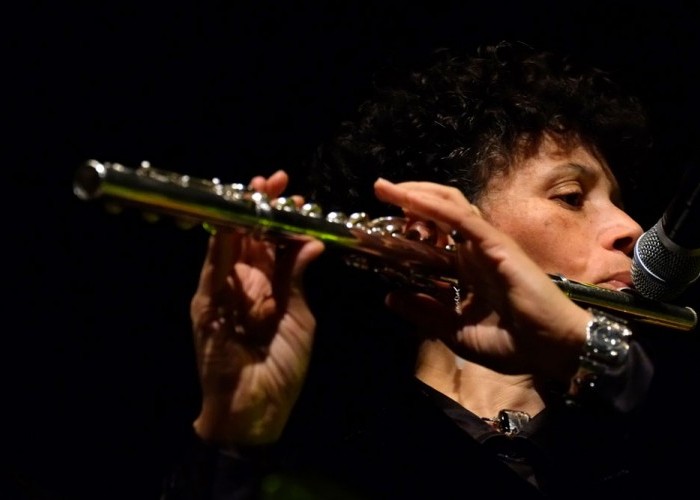
Nicole Mitchell is this year’s artist-in-residence at Winter Jazzfest in New York.
(Photo: Lauren Deutsch)For flautist and composer Nicole Mitchell, Gwendolyn Brooks is a “huge inspiration.”
Aside from her prolific literary career, which includes being the first African-American to win a Pulitzer Prize, Brooks, like Mitchell, adopted Chicago as her home and often as the backdrop for her depictions of black life in America.
Mitchell’s 11 p.m. Friday set at the New School’s Tishman Auditorium explores the writer’s influence with “Art And Anthem For Gwendolyn Brooks,” a suite of new music composed by the flautist. It also marks the first of four distinct live sets for Mitchell, this year’s artist-in-residence, at Winter JazzFest.
“I’m real excited to do [this] project, because I feel that her poetry tells the truth and that’s what we need right now,” Mitchell said. “It gives those outside of the black experience more of an insight into some of the challenges that black people face. She had a great ability to express the bigger picture of life in Chicago for African-Americans and how that connects nationally and internationally.”
Mitchell, just days before the festival, discussed how her own ties to The Windy City have inspired some of her most ambitious and politically-charged work.
When and why did you move to Chicago?
I moved to Chicago in 1990, right into my early adulthood. Halfway through my childhood, we moved to Orange County, California, which was not a welcoming place for African-Americans. Because I had my grandparents and lots of relatives in Chicago, I got to spend a lot of my Christmases and summers there. It gave me a real perspective on how there are places that are supportive and where people don’t stare you down or you’re not a magnet for violence. It was very healing to have that connection. It was also an attraction because I had a romanticism about my mother being from the South Side, and she died when I was 16. It was a way of being closer to her—to be where she grew up and to be part of that environment.
Chicago’s arts community is amazing. Not just that there’s great musicians and artists there, but the infrastructure that supports those artists is really amazing. That’s what makes it what it is, in terms of being a center for creativity and exploration, kind of a fearless approach to experimentalism, which you don’t find as often in the black community. It’s totally embraced there—from Sun Ra on. Before he went to Philly, [Chicago’s] where he became the “intergalactic explorer.”
The moment for me to make my decision that I wanted to be a jazz musician was in the New Apartment Lounge, listening to Von Freeman. I mean it was like, “This is what I want to do.” Chicago definitely has this kind of lineage of mentors that have been there: [tenor saxophonist] Fred Anderson being a really important one for me and a lot of other musicians that came after me with the Velvet Lounge being a center for the young people to do their thing.
For more than 50 years, The Association for the Advancement of Creative Musicians and Third World Press have kept black identity and thought alive in the arts. Given your ties to these organizations, can you elaborate on how instrumental they’ve been to your career?
As soon as I got to Chicago, I went to Third World Press, which at the time was on 75th and Cottage Grove in this little storefront where they had a school, a bookstore and a press almost all in one room. But they were doing so much, and it was such incredible work. I just wanted to be part of it. I mean I didn’t want to just work a random job; I wanted to do something with purpose. And I knew being a part of that, I would learn so much and also could be making a difference. It was a really important part of my life to be a part of that community. It’s about self-determination, creating for your own and making the solutions that are needed, rather than just complaining about what’s wrong. To see that in action, that was definitely a huge learning experience.
[Poet and co-founder] Haki Madhubuti, being at the center of that, was a great mentor not only for me to read all those books that we were working on, but to be around an institution builder. “No” was never a possibility; we’re going to make this work no matter what the challenges are. That definitely seeped into how I approach the things that I’m trying to do.
AACM and Third World Press are very important institutions from the Black Arts Movement in Chicago. Even when I came in [as a member in 1995 and later as its first woman president], AACM was still a really solid institution for, first of all, select mentorship, where musicians from Chicago and other parts of the world are still affiliated with the organization and are still accessible to new members.
On Liberation Narratives (Black Earth Music), the relationship between you and Madhubuti harkens back to The Midnight Band with Gil Scott-Heron, another Chicagoan, and flautist Brian Jackson.
Liberation Narratives was commissioned by the Jazz Institute of Chicago in 2014. That was our initial experiment with it and then it developed. I really was a perfectionist with it. I just had a really specific thing that I heard with it and wanted to get it to a certain level. ... That was really hard, but I was very satisfied that [Madhubuti was] happy. He’ll call me and he’ll say, “I was listening to it again and I heard this.” That’s what really means a lot to me, because I wanted to move him in terms of how he heard it.
This is the first recording he’s made with music since the ’70s. He’s 75 now, and I really wanted to capture his voice. Aside from being an institution builder and a poet, what’s really important about Haki is that he’s someone, as a black man, who if you look at what he was doing in the ’60s and ’70s until now, in some ways, he really was the definition of the strong black man, in terms of redefining that identity toward liberation. But then he also was trying over many years to get to that next level to represent what we now call a “feminist black man,” who really understands the importance of the contributions of women and honors that. A lot of these poems are right at the transition in a sense, where he’s expressing the transition of that consciousness. … And I think he’s kind of voiced that search for identity in his poems in a really interesting way.
The album was recorded two days after the 2016 presidential election at the University of Chicago. What has it been like to now experience the work a year into Donald Trump’s presidency?
It’s been kind of like a sanctuary. The music provides a space where people, myself included, can be empowered and have joy. I really feel that it’s important for us as people to nurture our imagination and creativity more than anything else. If the negative things that are going on squash our imagination, then they squash our future. Vision is one of the most important things that we can have as human beings, and so the music is a vehicle for people to have vision. Listening to music can help to imagine alternative worlds and visit other spaces in consciousness or literal imaginary spaces. And making the music is the same. So, it’s more important than ever to be a part of it, to connect and create community with it. Yeah, I’m thankful to have it. DB
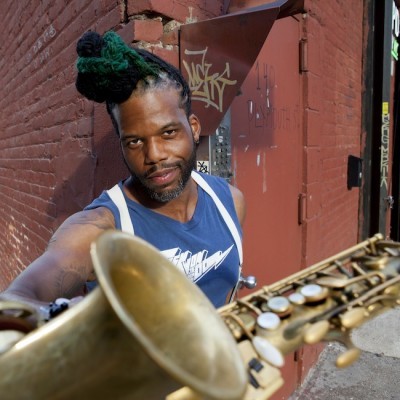
Benjamin possessed a fluid, round sound on the alto saxophone, and he was often most recognizable by the layers of electronic effects that he put onto the instrument.
Apr 2, 2024 12:59 PM
Casey Benjamin, the alto saxophonist, vocalist, keyboardist and producer who stamped his distinctive sounds on the…
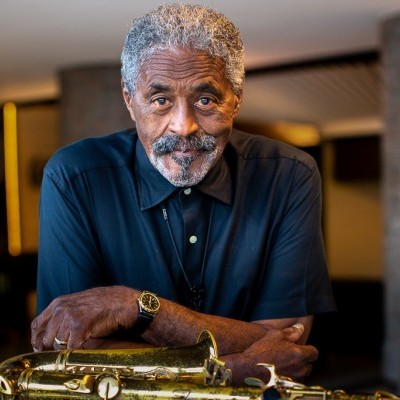
“He’s constructing intelligent musical sentences that connect seamlessly, which is the most important part of linear playing,” Charles McPherson said of alto saxophonist Sonny Red.
Feb 27, 2024 1:40 PM
“I might not have felt this way 30 to 40 years ago, but I’ve reached a point where I can hear value in what people…
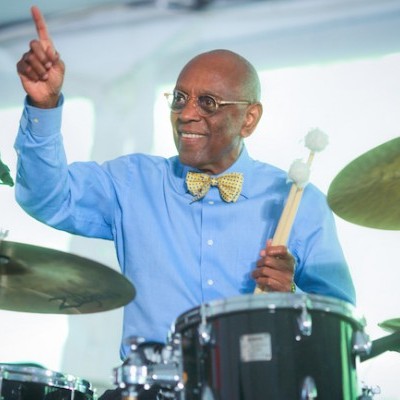
Albert “Tootie” Heath (1935–2024) followed in the tradition of drummer Kenny Clarke, his idol.
Apr 5, 2024 10:28 AM
Albert “Tootie” Heath, a drummer of impeccable taste and time who was the youngest of three jazz-legend brothers…
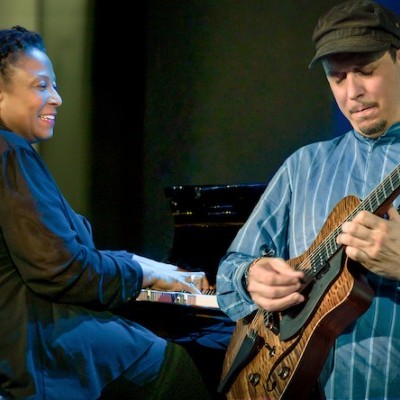
“Both of us are quite grounded in the craft, the tradition and the harmonic sense,” Rosenwinkel said of his experience playing with Allen. “Yet I felt we shared something mystical as well.”
Mar 12, 2024 11:42 AM
“There are a few musicians you hear where, as somebody once said, the molecules in the room change. Geri was one of…
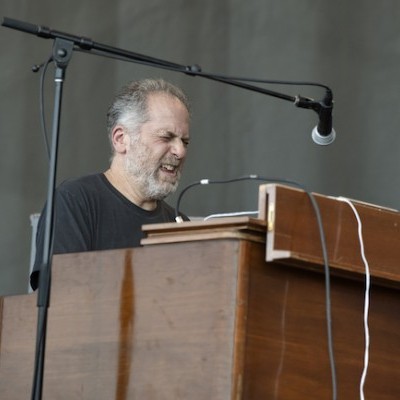
Larry Goldings’ versatility keeps him in high demand as a leader, collaborator and sideman.
Feb 21, 2024 10:45 AM
Are you having any fun? Larry Goldings certainly is. Consider just two recent examples:
Scene 1: “If anyone had…